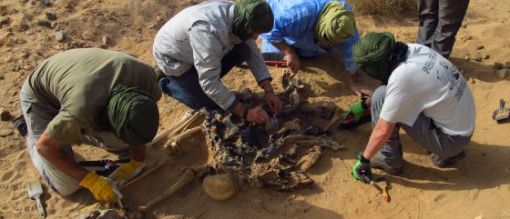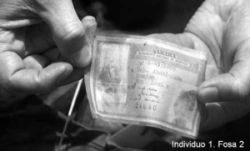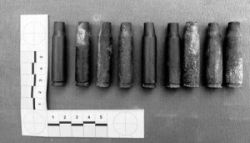
A new report documents the discovery of eight executed Sahrawis in Western Sahara. The executions have not previously been known and shed light on Moroccos secrecy with regard to previous disappearances.

In February 1976 six adults and two children were arrested by Moroccan military patrols and executed with firearms on the spot before being buried in shallow graves in sand and stones. A shepherd recently discovered human remains in the Fadret Leguiaa area, in the part of Western Sahara over which the liberation movement Polisario itself has control.
Now a new report sheds light on what happened to the group.
On 10 September 2013, a Spanish group of researchers from the University of the Basque Country and the Aranzadi Society of Sciences published a report that documents that the remains found are those of the Sahrawis who disappeared in 1976. The researchers made a thorough examination of circumstances around the incident - among other things, by using DNA tests and interviewing the next of kin.
Download the report here.
The report sheds new light on old abuses and has been received with great interest by the population of Western Sahara. It was presented in Rabat by Vice President Ghalia Djimi of the organization Association Sahraouie des Victimes des Violations Graves des Droits de l'Homme Commises par l'Etat du Maroc (ASVDH).
"We have waited for 7 years for an answer to a letter we sent to the Moroccan authorities about what happened to our relatives," Djimi told AFP new agency (read article here).
This week the researchers and relatives of those who disappeared will present the findings to the UN Commission on Human Rights.

The eight disappearances that are taken up in the report did not appear in the work of the Equity and Reconciliation Commission (IEC) established by Moroccan authorities in 2004, which focuses on, among other things, forced disappearances. Four of these incidents were examined by the Advisory Council on Human Rights (CCDH), which is a national Moroccan human rights institution that follows up IEC cases. In the discussion of the case by the IEC, it was ascertained that the four who disappeared were arrested near Amgala and then imprisoned in Smara, where they later died. The IEC's and the CCDH's work has always been criticized by the Sahrawis because they have not studied the Moroccan abuses of the Sahrawis thoroughly.
Amnesty International emphasizes, in a statement before the weekend, the importance of securing the evidence used in the investigation.
“The diverging conclusions about four of the eight Sahrawis who disappeared - as explained by the CCDH on the one hand and by the Spanish team on the other - raise questions about the accuracy of the conclusions published by the CCDH about all the other cases of forced disappearance,” Amnesty commented.
More than 500 Sahrawis are supposed to have disappeared since Morocco occupied parts of Western Sahara.
Because of the tension and lack of confidence between Moroccan authorities and Polisario, Amnesty wants an independent and impartial investigation of the disappearances in order to hold the culprits accountable. In addition, Amnesty wants the UN, as an independent body, to take care of such an investigation. This may also make it possible that Moroccan authorities could reopen other cases that they previously had wanted to conceal both for the Sahrawis and for the international community.
Amnesty points out that in an area where collaboration between the parties is quite unlikely it is important that the UN may step in and ensure just treatment with regard to both the victims and the relatives.
“This discovery emphasizes the need to investigate a large number of disappearances from the past. Morocco has not done enough to ensure justice for the victims and their families,” Erik Hagen, head of The Support Committee for Western Sahara, stated.
Order our Western Sahara poster!
“Try to Visit Western Sahara”…
The Security Council fails Western Sahara and international law
On 31 October 2025, a new resolution was adopted in the UN Security Council calling on the Saharawis to negotiate a solution that would entail their incorporation into the occupying power, Morocco.
Saharawis Demonstrate Against Trump Proposal
The United States has proposed in a meeting of the UN Security Council on Thursday that the occupied Western Sahara be incorporated into Morocco.
Skretting Turkey misled about sustainability
Dutch-Norwegian fish feed giant admits using conflict fishmeal from occupied Western Sahara. Last month, it removed a fake sustainability claim from its website.



